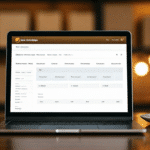Understanding the UPS Worldwide Express Freight International Import Bill and Third Party Freight Collect
If your business engages in international trade, efficient shipment processes are crucial. Whether exporting products or importing supplies, reliable shipping services ensure seamless transactions. UPS Worldwide Express Freight is a renowned name in the freight industry, offering swift delivery and cost-effective pricing. Beyond basic billing, UPS tracks shipments in real-time, providing updates on the location and status of your goods.
What is UPS Worldwide Express Freight?
UPS Worldwide Express Freight is a logistics solution designed for speedy international deliveries. Serving over 220 countries and territories, UPS ensures timely arrival of your shipments. In 2023, UPS expanded its global network, enhancing delivery speed and reliability across emerging markets.
In addition to fast delivery, UPS Worldwide Express Freight offers customizable options tailored to specific shipping needs. These include temperature-controlled transportation, specialized handling for fragile or hazardous materials, and comprehensive customs clearance assistance. Advanced tracking technology allows real-time monitoring of shipments, ensuring visibility from dispatch to delivery.
The Importance of International Import Bills in Freight Shipping
The international import bill is a detailed report outlining all charges involved in the shipping process, including freight charges, taxes, duties, and other fees. According to the World Bank's 2023 Trade Report, understanding import bills is essential for accurate cost management and compliance in international trade.
Moreover, the import bill serves as a legal document detailing the terms and conditions of the shipment, including information about the carrier, consignee, and the goods shipped. This is crucial for customs clearance and adherence to international trade regulations.
Transparency in the international import bill fosters accountability, allowing shippers to track expenses and prevent overcharging. A clear breakdown of all charges minimizes disputes between shippers and carriers.
Third-Party Freight Collect: Definition and Explanation
Third-party freight collect is a payment method where a third party is responsible for paying freight and additional charges instead of the shipper or consignee. This option is beneficial for minimizing upfront costs and managing cash flow effectively.
The third party can be a freight forwarder, logistics company, or any entity willing to pay the freight charges on behalf of the shipper or consignee. They subsequently bill the shipper or consignee for the freight charges and any additional fees or surcharges.
It's important to differentiate third-party freight collect from collect on delivery (COD). While COD involves the carrier collecting payment upon delivery of goods, third-party freight collect involves upfront payment by a third party, followed by reimbursement to the shipper or consignee.
Benefits of Using UPS Worldwide Express Freight for Your Business
Utilizing UPS Worldwide Express Freight offers numerous advantages, including:
- Fast Delivery Times: Ensures timely arrival of shipments globally.
- Reliable Service: Consistent and dependable shipping operations.
- Comprehensive Shipping Services: Includes temperature-controlled transportation, hazardous material handling, and more.
- Global Network: Access to UPS's extensive network facilitates streamlined business processes and efficient delivery.
- Advanced Tracking System: Real-time tracking provides visibility and control over shipments.
- Customs Clearance Services: Simplifies international shipping by ensuring compliance with regulations.
According to a 2023 Logistics Management Report, businesses using UPS Worldwide Express Freight experienced a 15% increase in shipping efficiency and a 10% reduction in transit times compared to other major carriers.
Understanding the Different Charges in UPS Worldwide Express Freight International Import Bills
The international import bill for UPS Worldwide Express Freight includes various charges such as:
- Freight Charges
- Customs Duties
- Customs Brokerage Fees
- Taxes
- Applicable Surcharges
- Tariffs
- Other Fees
These charges can vary based on the destination country and the type of goods being shipped. For instance, countries may impose higher customs duties or taxes on specific products. Shipping hazardous materials or oversized items may also incur additional fees. Consulting with UPS or a customs broker can provide a clearer understanding of the specific charges for your shipment.
How to Calculate Your UPS Worldwide Express Freight Charges
Calculating UPS Worldwide Express Freight charges involves considering:
- Shipment Dimensions and Weight: The size and weight of your shipment impact the cost.
- Origin and Destination: The distance and specific locations affect pricing.
- Shipping Speed: Faster delivery options typically cost more.
- Goods Classification: Using the Harmonized Tariff Schedule to determine tariff codes.
Utilize the UPS Worldwide Express Freight Rate Tool to estimate shipping charges accurately. Additionally, selecting services like liftgate delivery or inside pickup may incur extra fees, so reviewing the UPS Worldwide Express Freight Terms and Conditions is recommended.
Tips to Reduce Your UPS Worldwide Express Freight Costs
To minimize costs associated with UPS Worldwide Express Freight, consider the following strategies:
- Efficient Packaging: Optimize packaging to reduce size and weight.
- Consolidate Shipments: Combine multiple shipments to maximize space and reduce the number of shipments.
- Choose the Right Delivery Option: Select services that align with your budget and timeline.
- Accurate Shipping Documentation: Provide precise information to avoid unnecessary fees.
- Negotiate Rates: Frequent shippers may leverage shipping volume for discounted rates.
- Utilize UPS Online Tools: Take advantage of resources to manage shipments efficiently and reduce costs.
Staying informed about UPS's pricing and policy updates can also help in identifying new opportunities to save on Freight costs.
How to Choose the Right Third-Party Logistics Provider for Your Business
Selecting an appropriate third-party logistics (3PL) provider is vital for successful shipments. Key factors to consider include:
- Expertise and Experience: Choose providers with a proven track record in your industry.
- Range of Services: Ensure they offer services that meet your specific shipping needs.
- Customer Support: Reliable support is essential for addressing any issues promptly.
- Technology and Systems: Providers should have up-to-date technology that integrates seamlessly with your systems for accurate tracking and real-time visibility.
- Security Measures: Protecting sensitive data and shipments is crucial.
According to a Supply Chain Digital Guide, selecting a reliable 3PL can lead to a 20% improvement in supply chain efficiency and a significant reduction in logistics costs.
Common Mistakes to Avoid When Dealing with Third-Party Freight Collect
When utilizing third-party freight collect, avoid the following common mistakes:
- Assuming Complete Documentation Handling: Ensure that all necessary documentation is accurately provided. Do not rely solely on the third party for documentation.
- Unclear Payment Terms: Clearly define and confirm the payment arrangement terms, including responsibilities for different costs, before finalizing the shipment.
- Lack of Communication: Maintain open communication with all parties involved to prevent misunderstandings.
The Role of Technology in Streamlining the UPS Worldwide Express Freight Shipping Process
Technology is integral to optimizing the UPS Worldwide Express Freight shipping process. Key roles include:
- Real-Time Tracking: Provides visibility into shipment status, enhancing control and responsiveness.
- Automation: Reduces manual errors and increases operational efficiency through automated processes.
- Data Analytics: Enables data-driven decision-making to improve shipment strategies and cost management.
Advanced technologies like digital twins and AI-driven analytics are increasingly being adopted to forecast demand, optimize routes, and enhance overall logistics performance.
Best Practices for Successful International Import Bill Payment
Ensuring successful payment of international import bills involves:
- Accurate Documentation: Ensure all documents are complete and free of errors to prevent delays.
- Understanding Charges: Familiarize yourself with all applicable charges and fees.
- Agreeing to Payment Terms: Establish and agree upon payment terms with all parties in advance.
- Reliable Payment Methods: Use secure and efficient payment methods to avoid delays.
Upsides and Downsides of Using Third-Party Freight Collect in Shipping
Using third-party freight collect offers several advantages, including:
- Cost-Effectiveness: Reduces upfront shipping costs.
- Flexibility: Offers versatile payment options.
- Convenience: Simplifies financial management by outsourcing payment responsibilities.
However, there are potential downsides:
- Payment Delays: Reimbursement processes can sometimes cause delays.
- Disputes Over Charges: Lack of clarity in payment terms can lead to disagreements.
Choosing a trustworthy provider and clearly defining payment terms can mitigate these risks.
How to Deal with Disputes and Issues in UPS Worldwide Express Freight Shipping
In the event of disputes or issues with your UPS Worldwide Express Freight shipment, follow these steps:
- Contact Customer Support: Reach out to UPS customer service immediately to report and address the issue.
- Review Terms and Conditions: Understand the dispute resolution process as outlined in the service agreement.
- Document Everything: Keep detailed records of your shipment's progress, communications, and any discrepancies.
- Seek Mediation: If necessary, involve a neutral third party to facilitate dispute resolution.
Future Trends and Developments in the International Freight Shipping Industry
The international freight shipping industry is evolving with advancements in technology and sustainability. Key trends include:
- Digitalization: Enhanced digital platforms for better tracking and management.
- Automated Goods Handling: Use of robotics and automation to improve efficiency and reduce costs.
- Real-Time Tracking Enhancements: More precise and comprehensive tracking capabilities.
- Environmentally-Friendly Solutions: Development of green shipping practices to reduce carbon footprints.
According to a McKinsey Report from 2023, the adoption of sustainable practices and advanced technologies is expected to drive significant growth and efficiency in the freight shipping industry over the next decade.
Conclusion
UPS Worldwide Express Freight stands out as a reliable and globally recognized logistics solution with an expansive network. Understanding the nuances of international import bills and third-party freight collect is vital for effective international shipping. Selecting the right third-party logistics provider and leveraging technology can streamline the shipping process, ensuring your shipments arrive on time and in optimal condition. By implementing the strategies and best practices outlined in this article, your business can achieve greater efficiency and cost-effectiveness in international freight shipping.






















